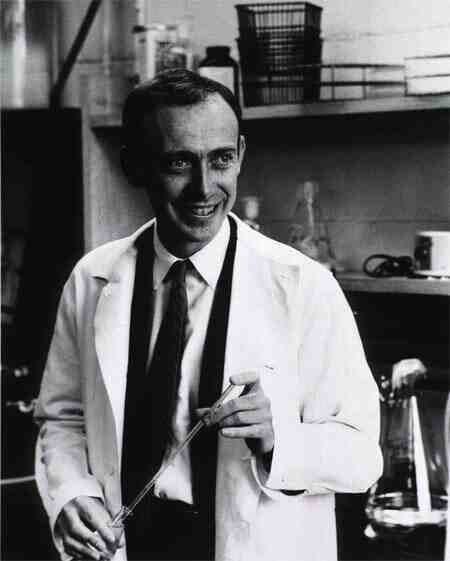Speaking at University College Cork last night, while presenting the inaugural Cancer Lecture of the Cork Cancer Research Centre (CCRC), Watson told a packed audience of his ongoing research into finding a cure for cancer at the Cold Spring Harbor Laboratory in New York where he is now Chancellor Emeritus.
Striking a highly optimistic note, the Nobel Laureate bemoaned some pessimistic cancer researchers who he said were more interested in merely researching cancer and didn't realise that they had an obligation to cure people and to save lives.
"We are nearly there", was his message for the evening, having suggested that the medicines to do the job might already be in use for a variety of ailments, but that doctors and scientists may not have recognised their anti-cancer properties yet.
Watson explained how he initially became interested in cancer research early on in his career. So much so, that he included a whole chapter on cancer in the first edition of his seminal textbook Molecular Biology of the Gene, which was originally published in 1965. The book was based on a a ten-lecture series he had been giving at Harvard for six years to introductory biology students and its format was ground-breaking at the time.
In the preface to the 1965 edition, Watson proclaimed that "it is time to reorient our teaching and to produce the new texts that will give the biologist of the future the rigor, the perspective, and the enthusiasm that will be needed to bridge the gap between the single cell and the complexities of higher organisms. The we may expect hard facts about today's most challenging biological problems: the structure of the cell, the nature of cancer, the fundamental mechanism(s) of differentiation, and how the ability to think arises from the organization of the central nervous system".
Writing in the final chapter of the first edition, Watson explains his hopes for elucidating the causes of cancers and beginning to treat them effectively. In "A Geneticist's View of Cancer", he writes that scientists at the time were just beginning to understand the genetic makeup of the diseases.
Even at the time, just over a decade after the publication of the double-helical structure of DNA, Watson was optimistic that "an understanding of at least some aspects of uncontrolled cell growth may soon be achieved at the molecular level. Such optimism arises from recent, spectacular results on the induction of tumors by viruses".
'Only today are we beginning to gain some confidence that we are close to understanding the essential molecular features upon which the life of even the simplest bacterial cell depends' - James Watson, 1965As a young scientist, at the time, he recognised the obstacles that lay ahead: "Only today are we beginning to gain some confidence that we are close to understanding the essential molecular features upon which the life of even the simplest bacterial cell depends. The jump to an attempt to understand the much more complex vertebrate cell with its thousandfold greater amount of DNA has only begun".
Born in Chicago in 1928, James Dewey Watson received his degree from the University of Chicago in 1947, having enrolled in university at the age of just 15. A PhD from Indiana University followed in 1950 and the young scientist then spent two years doing postdoctoral work in Copenhagen before moving to the Cavendish Laboratory at Cambridge University.
In the Spring of 1953, while still at Cambridge, Watson and his colleague Francis Crick published the results of their collaboration - the elucidation of the double helical structure of DNA.
Watson has had several high-profile roles over the years, including serving as the director, president and chancellor of Cold Spring Harbor Laboratory in New York where he focused on the study of the genetic basis for cancer. He resigned as chancellor in 2007 after a controversy erupted over comments he made in an interview regarding race and intelligence. He was also involved in the Human Genome Project and was only the second person to publish his full genome publicly online.
'I think the ethics committees are out of control' - James Watson, 2010Prior to receiving an Honorary Doctorate from University College Cork last evening, Watson spoke to journalists telling them that he was in favour of less regulation for clinical trials as this could speed up the process of finding a cure for cancer: "We're terribly held back on clinical tests by regulations which say that no one should die unnecessarily during trials; but they are going to die anyway unless we do something radical. I think the ethics committees are out of control and that it should be put back in the hands of the doctors. There is an extraordinary amount of red tape which is slowing us down. We could go five times faster without these committees".
Speaking in an introductory address to the gathered audience, Prof. Gerald O'Sullivan of CCRC praised Watson: "His accomplishments and contributions transcend boundaries, disciplines, and generations. One of the greatest scientists ever, he is also a respected leader, a gifted administrator, a brilliant author and a beacon in the Gaelic Diaspora". Watson mentioned his mother's family during his speech who left Co. Tipperary during the famine.
Prof. O'Sullivan continued, "Hopefully mankind will also constructively use its increasing technical capability to live peacefully. If so, the humans in future millennia may not know of many from our time but they will know of the structure of DNA and of Watson and Crick as by then the ramifications of its discovery will have impinged on life in ways that we cannot yet imagine".
The Inaugural Cancer Lecture of the Cork Cancer Research Centre by James Watson is available as a series of video clips here.
An edited version of this article appears on the Guardian.co.uk Science Blog. You can read it here.
Parts of the post were also reported in the Wall Street Journal. You can read it here.





No comments:
Post a Comment